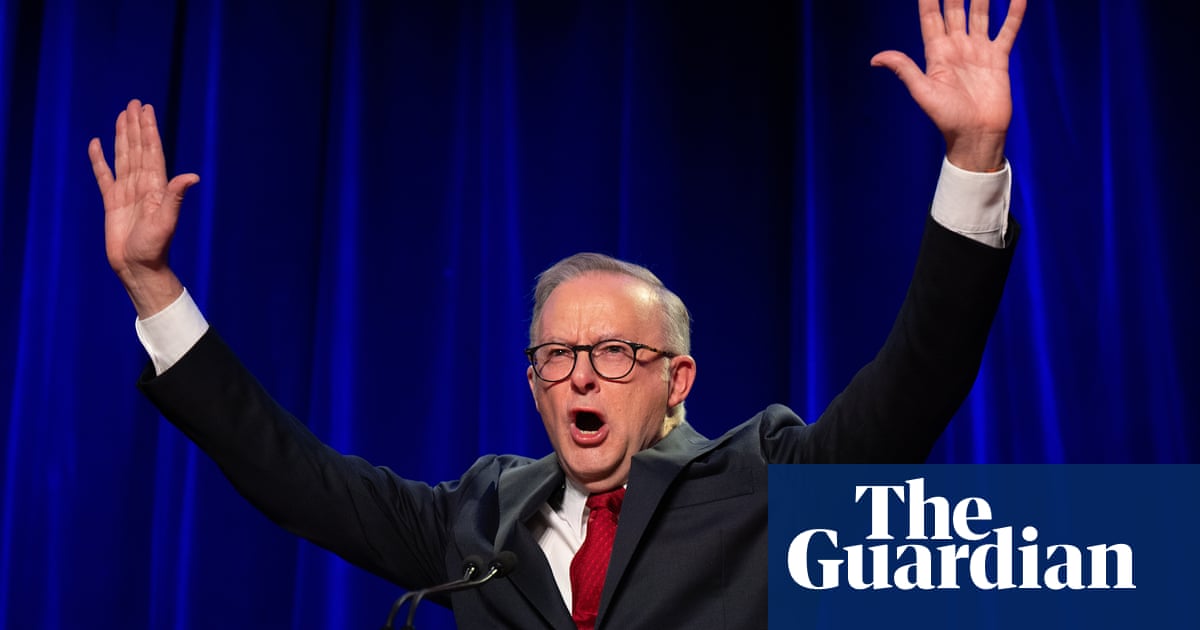It might have been the surprise packet of the night, but Labor picked up as early as January that it had a sniff in Dickson.
Early in the evening – hours before Anthony Albanese raised workers’ rights, housing, gender equality, childcare, the NDIS and Indigenous reconciliation as the priorities of his second-term Labor government – the hundreds-strong crowd at his election night party grew round-eyed as results from Dickson started pouring in on the television screens.
Amid unexpected large swings in seats Labor had barely talked about in the campaign – Banks, Hughes and Bonner – the crowd turned agog as big numbers started going their way in Dickson.
People in the room remembered that Dutton had trailed early in 2022, before coming back to win. In 2025, Labor people had briefly whispered about taking Dickson, with a major campaign effort and serious heavy-hitters deployed there for numerous visits – but late in the piece, expectations were tamped down.
As the ABC’s Antony Green called Ali France to win over Dutton, a cheer erupted from the Labor red-shirted faithful that was nearly as raucous and joyful as when the veteran psephologist called the election itself for Albanese.
Labor had been optimistic about holding on to government, whether in slight minority or majority, but the scale of victory – that may yet keep growing – stunned even some pollsters in the room. Seats fell like dominoes. The Coalition, already partially hollowed out after 2022, is reduced to a shell; safe seats cannoned to Labor, the moderate wing of the party decimated, Dutton losing not only the election but his job.
“Today, the Australian people have voted for Australian values. For fairness, aspiration and opportunity for all,” Albanese bellowed to the room of supporters, raising his hands in triumph. “For the strength to show courage in adversity and kindness to those in need.”
‘We’re going to be happier soon’
Labor people screamed as seats were called. The likes of Bennelong, a razor-thin seat that had been marked as notionally Liberal after a boundary redistribution, was returned to Jerome Laxale by a commanding 60-40 margin; Bridget Archer, the popular Liberal moderate, ejected from Bass; Anne Urquhart, the Labor senator who chanced her arm by running for the safe Liberal seat of Braddon, helped wipe out the Coalition from Tasmania; Deakin, Bonner, Forde, Menzies, the type of Liberal seats Labor hadn’t really talked up, projected to keep falling their way.
Seats held against stiff challenges that Dutton had targeted with his cost-of-living pitch – Gilmore, Hawke, Hunter, McEwen, Lyons, Paterson and Shortland – all failed to fall. Most came back to Labor with increased margins.
On the stage, hours before the result was called, a technical coordinator gave a brief rundown of some logistics for the night. Beginning her remarks and trying to get the crowd’s attention, she jokes that people are already feeling happy, “I’ve got a funny feeling we’re going to be happier soon tonight.”
Labor people had briefed out in recent days that Dutton was more unpopular than Morrison – particularly in key Tasmanian seats – and that an increased majority was on the cards.
One senior Labor source says the party had data from early this year that Labor could take Dickson. That effort was hidden in plain sight, Albanese visiting Dutton’s seat on the first and last days of his election campaign. In an interview with Guardian Australia last month, we asked if he was just trying to “troll” Dutton.
“We’re very serious about it,” he told us.
‘A man who shows what real strength is’
In the room, Labor people hugged, screamed, danced and cried. “It’s time” shirts were a common feature; as were towering pyramids constructed of cans of “Albo Ale”.
Albanese sipped from a glass of water as he gave his speech, laden with references to “Australian values”, “kindness”, saying Australians had “chosen optimism and determination”. The direct comparisons didn’t have to be made, people knew what he meant.
after newsletter promotion
Labor people put it down to Dutton’s negative campaign, his culture wars, his lack of positive vision for the country, his confused and confusing policy offering. When Dutton’s concession speech was broadcast to a quiet room, hundreds in the crowd waved their hands in mock goodbye to the Liberal leader.
When Penny Wong came on stage after Dutton’s speech, she referenced “our 26 million people from more than 300 ancestries”, and Australia’s Indigenous history.
She described Albanese as “a man who shows what real strength is. A man of courage, a man of compassion. A leader with the conviction of who we are.”
By the time of Albanese’s remarks, the crowd was delirious. His discussion of “the Australian way”, of centring progressive values of equality and equity, and recommitting to renewable energy and reconciliation, set the stage for what a second-term Labor government will look like.
Albanese didn’t make new policy promises tonight. Labor’s existing policy slate, while decried by some as humble, will take time to implement. Continuing the energy transition, ensuring the central housing policies actually build some houses, and continuing work toward closing the gap on Indigenous life outcomes, will take enough time and effort.
There was no promise or commitment, as there had been in 2022, to implement the Uluru statement from the heart; instead, a commitment to “reconciliation” was the closest Albanese came. Jim Chalmers, speaking later on the ABC, said Labor approached its second term with “humility”; Albanese spoke of Australia turning a corner, hinting at better days ahead.
Returned with an increased majority, Albanese enters a lofty pantheon of Australian politicians. He claims a piece of history, the first PM re-elected since John Howard; he will become, in his second term, one of the biggest heroes in the Labor mythology.
Albanese becomes arguably the most influential political figure since Howard, with a mandate for his policies, and an opportunity to bed down the reforms of his first term and to take his Labor project further, with newer and bolder reforms.
It is unclear where the Senate will sit. Despite the Greens going backwards in the House of Representatives, Albanese will likely still have to negotiate with minor parties in the upper house – but Albanese will likely enjoy one of the most progressive parliaments ever.
His position in history will be decided by how he uses those numbers delivered to him by Australians tonight.

